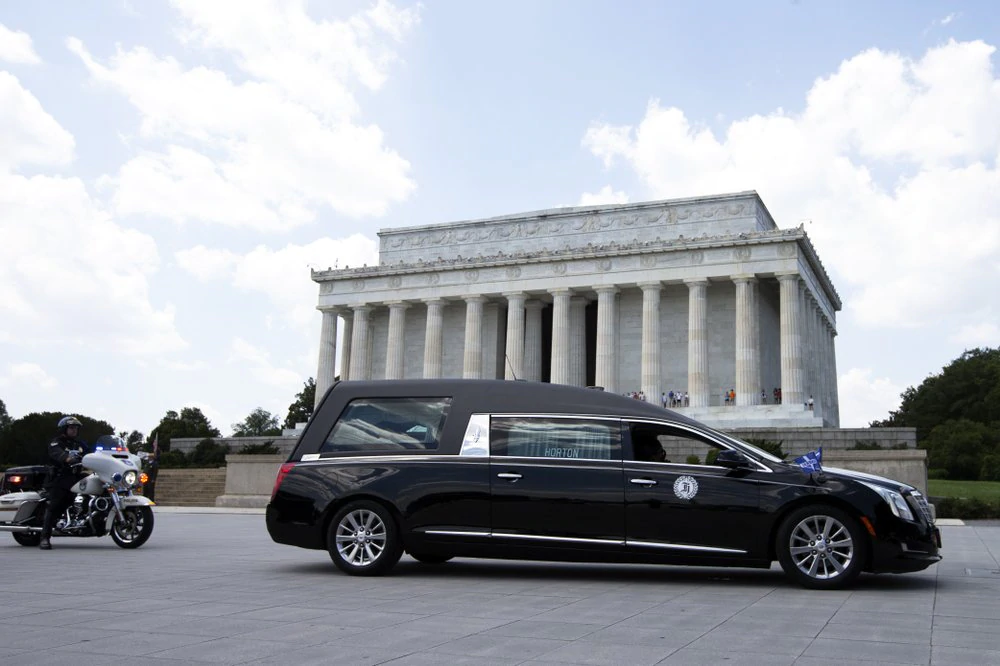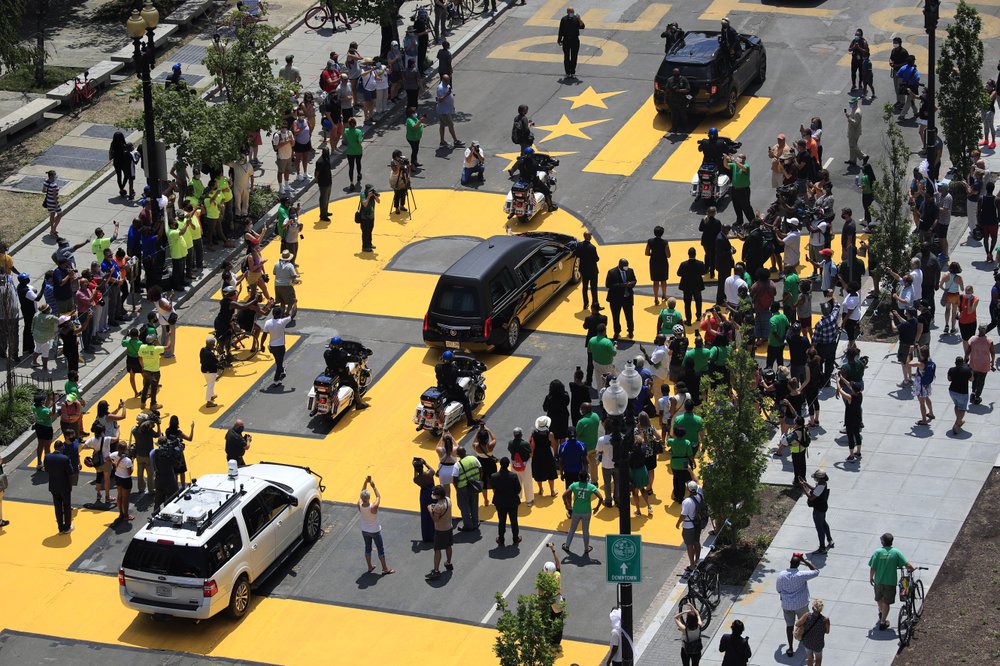[ad_1]
WASHINGTON (AP) — The body of the late Rep. John Lewis has arrived in Washington to lie in state as lawmakers gather to pay tribute to the long-time Georgia lawmaker and icon of the civil rights movement.
House Speaker Nancy Pelosi led a delegation Monday to Joint Base Andrews in Maryland to greet Lewis’s flag-draped casket. A motorcade carrying the body stopped at Black Lives Matter Plaza as it winds through Washington on its way to the U.S. Capitol, where he will be the first black lawmaker to lie in state in the Rotunda.
Pelosi and others will attend a private ceremony in the Rotunda before Lewis’s body is moved to the steps on the Capitol’s east side for a public viewing, an unusual sequence required because the COVID-19 pandemic has closed the Capitol to the public. Inside the Rotunda and outdoors, signs welcomed visitors with a reminder that masks would be required.
Read More: Joe Biden to honor Congressman John Lewis at Capitol
Presumptive Democratic presidential nominee Joe Biden, who served in Congress alongside Lewis, is expected to visit the Capitol to pay his respects. The pair became friends over their two decades on Capitol Hill together and Biden’s two terms as vice president to Barack Obama, the nation’s first Black president who awarded Lewis the Presidential Medal of Freedom in 2011.
Notably absent from the ceremonies was President Donald Trump, who publicly jousted with Lewis. Lewis once called Trump an an illegitimate president and chided him for stoking racial discord. Trump countered by blasting Lewis’s Atlanta congressional district as “crime-infested.”
Just ahead of the ceremonies Monday, the House passed a bill to establish a new federal commission to study conditions that affect Black men and boys.
Several members of the Congressional Black Caucus, including Reps. Cedric Richmond of Louisiana, Bennie Thompson of Mississippi and Karen Bass of California, were seen sporting “Good Trouble” face masks, a nod to one of Lewis’s favorite pieces of advice.
“Do not get lost in a sea of despair. Be hopeful, be optimistic,” Lewis tweeted in 2018. “Our struggle is not the struggle of a day, a week, a month, or a year, it is the struggle of a lifetime. Never, ever be afraid to make some noise and get in good trouble, necessary trouble.”

The tributes Monday were the latest in a series of public remembrances for the 80-year-old Alabama native who helped lead the Student Nonviolent Coordinating Committee during the peak of the civil rights era.
The son of sharecroppers, Lewis was among the original Freedom Riders, a group of young activists who boarded commercial passenger buses and traveled through the segregated Jim Crow South. They were assaulted and battered at many stops along the way, by both citizens and authorities. Lewis was the youngest and last-living of the featured speakers for the March on Washington in 1963, where the Rev. Martin Luther King Jr. delivered his “I Have a Dream” speec on the steps of the Lincoln Memorial.
In Selma, Alabama, on March 7, 1965, Lewis suffered a beating at the hands of an Alabama state trooper that became one of the defining moments of his life. He was at head of hundreds of civil rights protesters who attempted to march from the Black Belt city to the Alabama Capitol to demand access to the voting booth.
The marchers completed the journey weeks later under the protection of federal authorities, but then-Alabama Gov. George C. Wallace, an outspoken segregationist at the time, refused to meet the marchers when they arrived at the Capitol. President Lyndon Johnson signed the Voting Rights Act of 1965 on Aug. 6 of that year.
Lewis spoke of those critical months for the rest of his life as he championed voting rights as a foundation of democracy, and he returned to Selma many times for commemorations at the Edmund Pettus Bridge, where baton-wielding officers had brutalized Lewis and the marchers.
“The vote is precious. It is almost sacred,” he said again and again. “It is the most powerful non-violent tool we have in a democracy.”
Read More: Congressional Black Caucus Foundation renames fellowship after the late John Lewis
Lewis crossed the Edmund Pettus Bridge for the last time Sunday on a horse-drawn carriage before an automobile hearse transported him to the Alabama Capitol, where he lay in repose, becoming one of the few citizens who wasn’t a former governor to have such an honor. He was escorted by Alabama state troopers, this time with Black officers in their ranks, and his casket stood down the hall from the office where Wallace had peered out of his window at the voting rights marchers he refused to meet.
Lewis already has had a public funeral in his hometown of Troy, Alabama. He will have a private funeral Thursday at Atlanta’s historic Ebenezer Baptist Church, which King once led.
___
Barrow reported from Birmingham, Alabama. Associated Press writer Mary Clare Jalonick contributed to this report from Washington, DC.
Have you subscribed to theGrio’s new podcast “Dear Culture”? Download our newest episodes now!
[ad_2]
Source link


